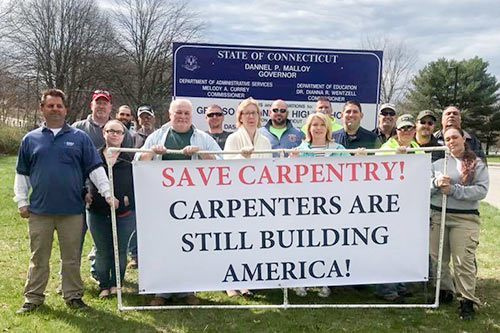Committee Leaders, Senators Looney and Moore Criticize Republicans for Opposing Bill to Increase Democracy
The Democratic co-chairs of the Higher Education and Employment Advancement Committee and two other Democratic senators today blasted legislative Republicans for once again taking a party-line stance against a bill that would increase democracy and voter participation on Connecticut’s college campuses, saying Republicans are willing to vote against more public participation in the election process because they may fear those college-age voters will cast their votes for Democratic candidates instead of Republicans.
The criticism by Higher Education committee Co-Chairs Senator Beth Bye (D-West Hartford) and Rep. Gregg Haddad (D-Mansfield) came after Republican legislators cast their second party-line vote in a month against House Bill 5420, “AN ACT REQUIRING ADDITIONAL POLLING PLACES AT INSTITUTIONS OF HIGHER EDUCATION DURING STATE ELECTIONS,” which would require cities and towns to create a separate voting district on the campus of any public or private college or university in Connecticut enrolling more than 3,000 students.
On March 23, all eight Republican members of the Government Administration and Elections Committee voted against the bill; today, all eight Republican members of the Higher Education and Employment Advancement Committee voted against the bill. Democrats on both committees unanimously supported the bill.
“How many times have we heard members of both political parties say that voting is a fundamental right, something guaranteed us by our forefathers and defended in war, and yet many college students living in Connecticut for most of the year are effectively denied the opportunity to vote because they don’t have reasonable access to a voting booth,” Sen. Bye said. “We should make voting as easy as possible for everyone—Democrats, Republicans, unaffiliated voters, college-age students, working people, the elderly, everyone.”
“We should be doing everything possible in Connecticut to increase voter participation and to make it easier for everyone to vote in elections. This bill is one way we can do that; it’s an easy path to ensuring that college-age students in Connecticut can exercise the rights and freedoms guaranteed in the Constitution,” Rep. Haddad said. “Why Republicans would oppose this bill is baffling.”
“Access to the ballot box is a fundamental American right,” said Senate President Pro Tempore Martin M. Looney (D-New Haven), who testified in support of the bill at its public hearing. “With our democracy threatened by forces both foreign and domestic, ensuring that our college students are able to cast their vote is critical to our civic health. Establishing polling places on college campuses will enhance civic engagement among our future leaders.”
“Eager to vote—many for the first time—Connecticut college students, especially those who live on campus, face several challenges when trying to cast a ballot,” said state Senator Marilyn Moore (D-Bridgeport), who co-sponsored the bill. “I represent students from Sacred Heart University and the University of Bridgeport, and many of us can remember what it’s like for them: attending classes in the morning and evening, cramming in some study time before the library closed, going to a part-time job in-between—it’s one of the busiest times of our lives. Then Election Day comes and thousands of students don’t have time to submit an absentee ballot or make it off campus to vote. This has a detrimental effect on the health of our democracy. We should be making it easier for students to participate in electing those who represent them, but Republicans want to ensure that the voices of our young people continue to be unheard.”
The Connecticut Republican opposition to college student voting comes on the heels of the Connecticut Republican Party’s nearly unanimous opposition last week in the House of Representatives to an “early voting” resolution calling for a referendum on a constitutional amendment to allow early voting in Connecticut. Just three House Republicans joined with 78 Democrats to support a bill that is already in effect in 37 U.S. states and the District of Columbia.
Regarding college-age voting trends, according to a November 2016 Pew Research Center report on political party affiliation among American voters, in 1992, 49 percent of college graduates identified as Republican while 45 percent identified as Democrat. That political party identification has since changed, with 53 percent of college students identifying in 2016 as Democrat compared with 41 percent identifying as Republican. But among white college voters in 2016, party affiliation is evenly split: 46 percent Republican, 45 percent Democrat.
A September 2017 study by Tufts University’s Tisch College found that 48 percent of college-age students voted in the 2016 presidential election, far lower than the overall 60.2 percent voter turnout. Other reports suggest that mid-term elections (non-presidential election years) usually only attract about 14 percent of college-age voters—about one out of every seven students.
